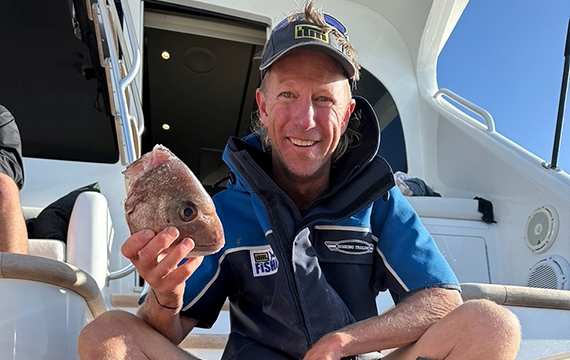Like so many other fishers, I love to catch fish. There is something deeply satisfying about catching a fish and taking it home to feed friends and family. I believe this feeling stems from our evolution. It is only in the last couple of hundred years that we as humans have been able to survive by earning moneyand purchasing food. Before that, we needed good hunter-gatherer instincts.
Hunting and gathering instincts
To ensure we survived as a species, we needed good instincts to kill, but we also needed good instincts to conserve because if all the fish were taken, all the animals were killed, or the entire crop harvested, there would be no food for tomorrow.
So for those of us that have a passion for fishing, this love of the ocean and it’s inhabitants can, in part, be put down to instinct. Therefore, the people that fish for the love of it are the guardians of the ocean; recreational fishermen are at the forefront of protecting fish stocks from commercial over-fishing where fish are being exploited for commercial gain, with little regard given to sustainability.
Through the show, we can inspire people to get into fishing, and we can also impart tips and advice to existing fishers to help them catch more fish. At the outset, encouraging more people to fish and sharing effective fishing techniques seems to go against our conservation ethos, but here’s how it works.

Catch only what you can eat and eat as much of the fish as possible
You protect what you love
The more people that can go out and successfully catch a fish to take home, the more people have that connection to the marine environment and, therefore, will want it protected. Sure, they will take a few fish in the process, but catching fish by hook and line to feed family and friends has been sustainable for thousands of years; it is part of the marine ecosystem. And all the recreational catch combined is just a fraction of the 400,000 tonnes taken commercially in New Zealand every year.
Just enough for a feed
Even so, we encourage fishers to only take what they need; “just enough for a feed” is a catch line. We also encourage the release of the larger breeding fish and help with fisheries research by tagging and releasing fish. While the recreational fishing take is comparatively small, it is still significant, and two wrongs do not make a right, so we all need to do our bit.
The more people that can go out and successfully catch a fish to take home, the more people have that connection to the marine environment and, therefore, will want it protected.
So how do we get fishers to fish conservatively?
For a start, we do not preach to them. People enjoy fishing because it is an escape from their busy lives, recreational time is precious, and I’m not likely to get a good response if I stand up and tell people how they should spend their time fishing. So instead, we show people by releasing big fish, and I explain the importance of these bigger fish to the reproduction cycle of the species. If you want a trophy (and let’s face it, most of us do), take a photo before letting it go. That way, you have captured that moment in time to savour forever.
By demonstrating how much enjoyment and satisfaction you can get by catching a feed of fish, releasing a big fish or tagging and releasing a fish, viewers will invariably try it themselves. But we still need to ensure that when we take fish responsibly for food or take the occasional big fish as a hardearned trophy, we do it unashamedly; after all, killing fish is as natural as breathing.
